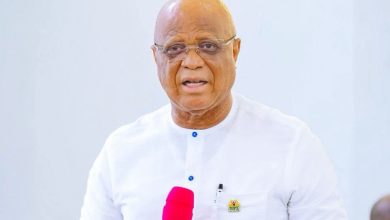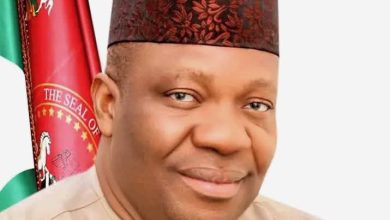
Governance is a serious business. In it lies the well-being of a nation. A country progresses only by the amount of quality inputs made by her leaders. It is garbage in, garbage out. Nothing more! Like in computing, incorrect or poor quality input will always produce faulty output.
The road to good governance is not a happenstance. It must be consciously and conscientiously accomplished. To wit, statecraft needs sound character and good conscience. Governance must be peopled by leaders who have a knack for the promotion of public good; who are given to probity or having such identifiable qualities necessary to govern a state.
Unfortunately, statesmanship vis-à-vis public decorum is fast dying out in Nigeria’s public space. The inventive and alluring characteristics associated with statecraft are almost extinct. Our political leaders are fast contriving our democracy with comedy. You can call it: ‘Democomedy’. It is a sad tale. But that is the emerging reality. Comical attitudes play out each turning moment and day with reckless abandon by those in power.
National discourse is gradually being narrowed to shadowy consideration. As Stephen Kinzer, an American author, journalist and academic warned, “Emotion is always the enemy of wise statesmanship.” Perfidious elements have inflicted cancerous influence on the governance procedures of our beloved nation Nigeria. Even when we call a spade a spade or speak truth to power, it makes no difference. We witness avoidable hallucinating scenarios in the public space by political gladiators irrespective of political parties. Our democracy is now given to screeching comedy. In the emerging ‘Democomedy’, public interest is circumvented and what is not desirable becomes their predilection.
READ ALSO: Let’s Halt The Ominous Signs Of Despondency
A flip of such ludicrous incidents occurred on Tuesday, July 21, 2020 at the House of Representatives. Not only were Nigerians flabbergasted by what occurred at the green chambers, the sordid event brought to the fore an incongruous mannerism that is fast becoming the new normal among our politicians and public office-holders. Senator (Dr.) Chris Ngige, minister of labour and productivity and James Faleke, member representing Ikeja Federal Constituency (Lagos State); were the characters in the sad episode. Ngige, a former governor of Anambra State, had appeared before the House Ad Hoc Committee on alleged “arbitrary breach of presidential directives on the suspension of top management and executive members of the Nigeria Social Insurance Trust Fund and other government agencies” by the ministry.
For whatever reason, the session went theatrical. Faleke had questioned Ngige to rationalise the merit of his appointment as a minister either as a faithful party (APC) man or based on his standing as a former governor and former senator, while also delving into the low votes he (Ngige) garnered in his ward as against the majority votes pulled by PDP. That laid the groundswell for the minister’s outburst. And he thundered: “Faleke, they said is up to 60. You are near my age, but I am at least seven years older than you. I’m sure; I am of the same age with your mentor in Lagos, Asiwaju Bola Tinubu. I was governor with him at the same time. He was a senator, and I was a senator. I am a two-time minister and he is not a two-time minister.” The committee members and other attendees reeled in laughter. Faleke, in an apparent reference to the controversies that trailed Ngige’s election as governor of Anambra State, retorted that Tinubu as mentioned by Ngige won his own election “very well”.
READ ALSO: Of Nigeria, EFCC And The Corruption Saga
Shamelessly, the exchange of words continued. The minister then reminded Faleke, who was a former deputy governorship candidate of the APC in Kogi State, how his struggle to replace his governorship candidate, Abubakar Audu, was frustrated after the latter died shortly after they both won the election. “Mr Minister, please respond,” Faleke fired back. “I am responding. You yab me, I will yab you 10 times. I am a Lagos boy. You are just a small boy in Lagos. Look at this boy. Mushin boy is talking to a VI (Victoria Island) boy. I live in Victoria Island,” Ngige said.
The apparent ‘childish’ exhibitions by both men, given the public offices they occupy, sent shock waves down the spines of many. Nigerians saw it as a public shame as the men threw decorum, statesmanship and public consideration to the winds. Otherwise, they couldn’t denigrate each other with such disdainful banter!
That was just one of such open altercations. On Tuesday, June 30, 2020, a similar drama ensued as Mr. Festus Keyamo, minister of state for labour and employment was walked out of a meeting with members of the Senate and House of Representatives Joint Committee on Labour at the National Assembly in Abuja. The lawmakers had invited Keyamo to give details on the Special Public Works Programme, where 774,000 people are billed to be recruited by the Federal Government under the National Directorate of Employment (NDE). At the meeting, the lawmakers had sought to find out the method of selection of a 20-man committee from each state for the programme only for a heated argument to erupt between them and Keyamo. And it was supposedly on who should drive the programme, parliamentary inputs and perhaps political consideration.
As the interface became rowdy, the committee decided to go into a closed-door session to discuss the matter, but the minister refused, insisting that further discussions can only be held in the presence of journalists. Miffed by the audacity of Keyamo, a lawyer and human rights activist, the lawmakers became enraged and demanded that he should apologise to the committee, but he bluntly refused. The committee wielded the big stick ordering the minster out as he (minster) refused to apologise to them. The committee laid their action on the grounds that Keyamo cannot direct them on how to conduct its proceedings.
The incident further exposed the weak links in the coordination of policies between the Executive and the Legislative arms. When such fisticuff abounds, it is the end beneficiaries of such programmes, in this case, the suffering masses, particularly the unemployed graduates, who stand to lose. And that programme needs not suffer any encumbrances.
Another show of shame occurred sometime in May 2020. The media gem-turned-politician, Mrs Abike Dabiri- Erewa, chief executive officer (CEO) of the Nigerians in Diaspora Commission (NIDCOM), got into a combat with Dr. Isa Pantami, the minister of communications and digital economy. And twitter became their confrontational platform. The messy affairs aroused when Abike accused Pantami of ordering gunmen to throw NIDCOM staff out of the office given to them by the Nigerian Communication Commission (NCC). She lashed out, “You did that because I’m a woman.” The minster responded, describing the accusation as “a fat lie.” The accusations and counter-accusations went on and on! It is rare to find public officials within the same canopy taking matters unguardedly like that to the public.
Such ‘uproar’ appears dominant in the present political dispensation. We have had the President’s first lady, Aisha Buhari, entangled in squabbles either with the ‘fabled’ cabals or aides of the President. The recent being an encounter in June 2020 when Buhari’s personal assistant and private secretary, Sabiu ‘Tunde’ Yusuf, refused to embark on 14-day isolation upon returning from a private trip to Lagos. The drama led to the alleged “shooting” in Aso Rock and the withdrawal and detention of her aide-de-camp (ADC), Usman Shugaba and other security details. It took days and apparent condemnation before they were released and restored to serve her.
It is odd that Nigerian politicians appear not to be conscious of our historical past. The journey we have made – the struggle we had faced with the colonialists and the post-independence military interregna with the attendant strains before we eventually achieved this current leg of civil rule in 1999. The malfeasance now being witnessed in the political spheres is odious and condemnable. Apart from denting the nation’s image within the purview of other healthy democracies, such squabbles are aggravated by corruption, which has eaten deep into the fabric of the nation, evoking loud cries and disapprovals.
There must be a U-turn from this road which can only lead to the biblical city of ‘Sodom and Gomorrah’ whose end was destruction. Good governance must match good politics. As late music maestro, Sunny Okosun, prodded, “Which way Nigeria? For how long shall we tread on this inglorious path?




